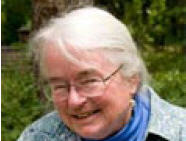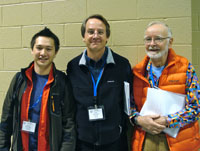Congratulations Mr. President:
From the AB Chair, Trish Morse
 Nearly one hundred Friday Harbor Labs faculty, students and supporters gathered at the January meeting of the Society for Integrative and Comparative Biology (SICB) in South Carolina. One highlight of the annual meeting was Ken Sebens, Director of the FHL, as the new president of SICB. Included throughout the conference many FHL people gave papers, posters and led important symposia presentations. Past SICB president, Mary Rice, was honored by the American Microscopical Society for her incredible contributions andservice.
Nearly one hundred Friday Harbor Labs faculty, students and supporters gathered at the January meeting of the Society for Integrative and Comparative Biology (SICB) in South Carolina. One highlight of the annual meeting was Ken Sebens, Director of the FHL, as the new president of SICB. Included throughout the conference many FHL people gave papers, posters and led important symposia presentations. Past SICB president, Mary Rice, was honored by the American Microscopical Society for her incredible contributions andservice.
Those attending from the FHL family were treated to a rare three-generational event. Steve Wainwright, FHL Emeritus Advancement Board member was joined by his son Peter, to hear the presentation by grandson Dylan. Peter, who spent time at FHL is now a professor at UC – Davis. Dylan, a senior at Duke, presented a paper based on his research last summer at FHL with Adam Summers in the NSF/Blinks/REU Summer Internship. To quote Steve, "Peter and I purred with pleasure all through Dylan's talk about clingfish." (As an asterisk, Adam reports that Dylan's paper was published in Science 20 January 2012:
Vol. 335 no. 6066 p.277 DOI: 10.1126/Science.335.6066.277 Society for Integrative and Comparative Biology –"Clingfish Stick Like Gecos.")
 As an undergraduate, Dylan tested the sticking ability of twenty-two freshly killed Goblesox maeandricus to adhere to eight different surfaces that mimic a range of sandpaper grades. He reported at the meeting that the fish adhered to all surfaces with an average force 180 times their body weight. (In contrast, rubber suction cups fell off rougher surfaces, sticking only to the three smoothest ones.) Scanning electron microscopy of the clingfish's belly fins revealed that the secret to its staying power may be a rim of microscopic hairs akin to what geckos utilize on their toes to enable them to walk upside down on ceilings.
As an undergraduate, Dylan tested the sticking ability of twenty-two freshly killed Goblesox maeandricus to adhere to eight different surfaces that mimic a range of sandpaper grades. He reported at the meeting that the fish adhered to all surfaces with an average force 180 times their body weight. (In contrast, rubber suction cups fell off rougher surfaces, sticking only to the three smoothest ones.) Scanning electron microscopy of the clingfish's belly fins revealed that the secret to its staying power may be a rim of microscopic hairs akin to what geckos utilize on their toes to enable them to walk upside down on ceilings.
The FHL Advancement Board continues to sharpen its efforts to support the activities of the College of the Environment and to focus on the specifics of the UW FHL strategic plan for future development. A major premise of the College of the Environment is to be a world leader in the rapidly evolving arena of environmental sciences and policy. FHL is uniquely poised to support research in the developing ocean acidification science. FHL research over the past seven years set baselines for temperature, salinity and organismic variations around the Puget Sound's northern environment. Studies have directed research into environmental questions relative to the organisms of this region as they change over time.
Currently the Advancement Board is continuing to review how future programs and development will retain FHL in a preeminent position for research and teaching. Insuring funding for this effort continues to rely on the past generosity of friends of the Labs. In the short term special attention is on the yearly Adopt-A-Student fund that guarantees a continuing source of future young scientists. The Advancement Board is extremely appreciative of donations that have been sent each year to support this program.

